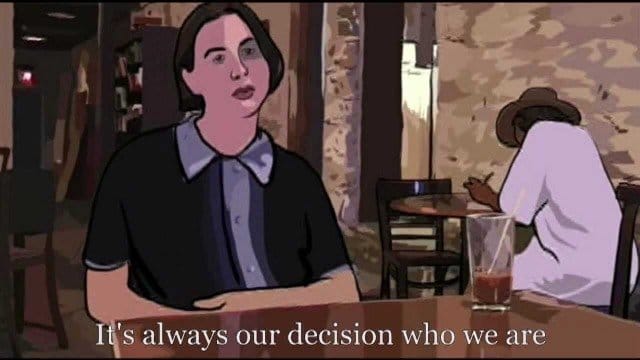"It's Always Our Decision Who We Are"

I was twenty-five years old when I first heard of the University of Texas Professor of Philosophy, Robert Solomon. The late professor gained some cultural recognition by appearing in the 2001 film, Waking Life, in which he spoke about one of his passions — existentialism. Dr. Solomon lamented the fact that the philosophy of existentialism was often seen as a grim and pessimistic way of thinking and of looking at the world. Instead, he said that he felt the message of existentialism to be one of positivity and liberation.
Robert Solomon’s quote from the film, in full, is as follows:
The reason why I refuse to take existentialism as just another French fashion or historical curiosity, is that I think it has something very important to offer us for the new century. I’m afraid we’re losing the real virtues of living life passionately in the sense of taking responsibility for who you are, the ability to make something of yourself and feel good about life. Existentialism is often discussed as if it’s, a philosophy of despair, but I think the truth is just the opposite. Sartre, once interviewed, said he never really felt a day of despair in his life. One thing that comes out from reading these guys is not a sense of anguish about life so much as, a real kind of exuberance, of feeling on top of it, it’s like your life is yours to create. I’ve read the post modernists with some interest, even admiration, but when I read them I always have this awful nagging feeling that something absolutely essential is getting left out. The more you talk about a person as a social construction or as a confluence of forces or as fragmented of marginalized, what you do is you open up a whole new world of excuses. And when Sartre talks about responsibility, he’s not talking about something abstract. He’s not talking about the kind of self or soul that theologians would argue about. It’s something very concrete, it’s you and me talking, making decisions, doing things, and taking the consequences.
Finally, he sums things up with a line that has stuck with me for my entire life — and has even made its way into a couple of my sermons when I was a priest. He says:
It might be true that there are six billion people in this world, and counting, but nevertheless -what you do makes a difference. It makes a difference, first of all, in material terms, it makes a difference to other people, and it sets an example. In short, I think the message here is that we should never simply write ourselves off or see each other as a victim of various forces. It’s always our decision who we are.
I first heard the latter part of this quote by Robert Solomon in 2006. As a young man living in an American society becoming increasingly enamored with the idea of ‘victimization’ or ‘being a victim’ for whatever reason and on whatever level, Solomon’s words were a breath of fresh air. We are not to be victims! We refuse to be! Of course! It’s always our idea who we are!
This doesn’t downplay real issues of marginalization or social stigmatization or the reality of biology. There is, in fact, an objective reality to face and contend with. Nevertheless, this is a hopeful message of empowerment and of taking control of our own lives. We have the power to effect change. We have the power to make a difference. Our life matters.
Though people like Sartre were not really ‘religious’ in any sense, there is absolutely nothing of this message that doesn’t fit in with a ‘deistic’ worldview — be it Christian, Muslim, or what have you. We should never write ourselves off to be ‘merely victims’ of sin or our fallen nature or of social, political, familial, etc. forces beyond our control. It is our decision who we are. And we make this decision, with God’s help. We choose to break the chains of our ego and our lusts and our passions and of evil and sin when we come to our senses and ‘wake up’, in a sense, as if out of a trance and choose the things of God. When we choose mercy, compassion, righteousness, and to do good in this world and towards others. We break the chain of sin and evil, when we align our will to the will of the Lord — He who is goodness, justice, righteousness, mercy Himself.
This is our true freedom. This is true beauty. This is true life.
“We should never simply write ourselves off or see each other as a victim of various forces. It’s always our decision who we are.”
May God grant us the grace to see, the wisdom to understand, and the courage to act.
(Update: After some conversation with a friend regarding the above article, I intend to produce a sort of ‘part two’ exploring the thought of one of my favorite Islamic philosophers, Muhammad Iqbal, along similar lines — ‘existentialism’, the self, Divine Will, and human freedom/flourishing.)
If you like this content, please consider a small donation via PayPal or Venmo. I am currently studying Islam and Arabic full-time with no income, and any donation — however small! — will greatly help me to continue my studies and my work. Please feel free to reach me at saidheagy@gmail.com.
Thank you, and may God reward you! Glory to God for all things!